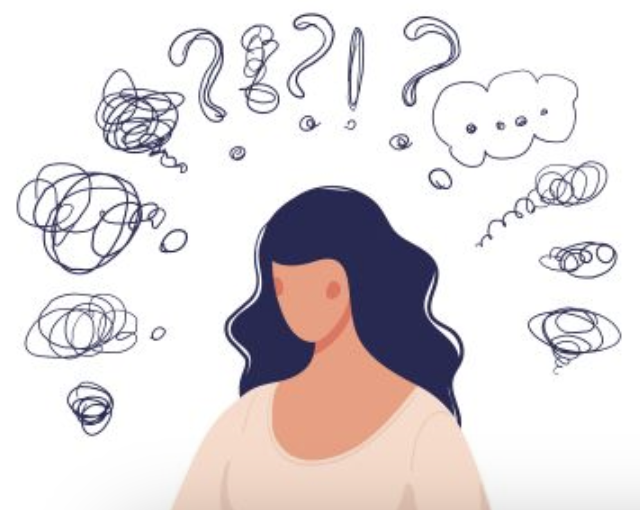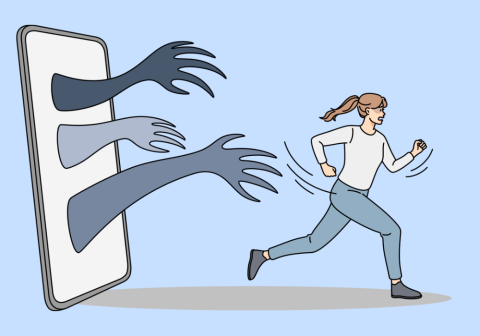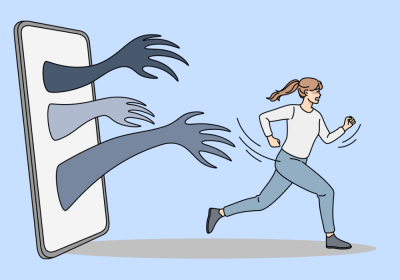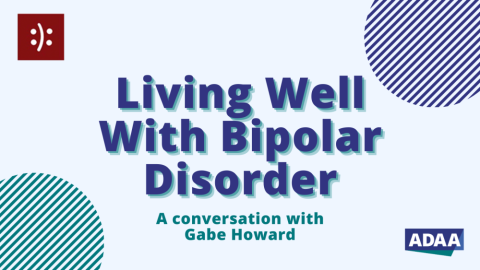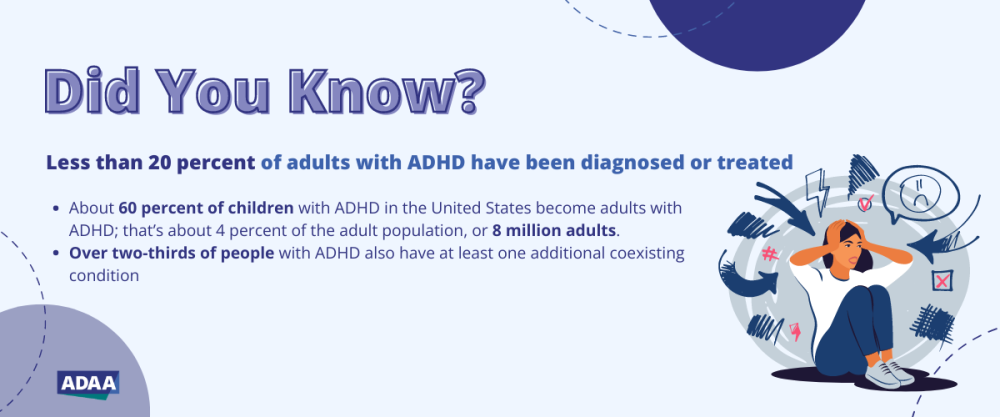
What is Attention Deficit Hyperactivity Disorder?
Attention deficit hyperactivity disorder, or ADHD, is a condition characterized by an ongoing pattern of inattention, hyperactivity, impulsivity, issues with executive functioning, or a combination.
Symptoms
ADHD symptoms often include an inability to focus, restlessness, and disorganization. People who have ADHD can experience different symptoms and often at different levels – that range from mild to severe.
Everyone can at times experience some of the above symptoms. However, for those diagnosed with ADHD these symptoms are experienced consistently and can negatively impact with their normal daily life.
Often sleep issues, stress, depression, anxiety and other physical issues can manifest as symptoms resembling ADHD. It is imperative that anyone suspecting they may have ADHD reach out to their doctor to ensure an accurate diagnosis of the cause of the symptoms and the proper treatment.
ADHD and Mental Health
Over two-thirds of people with ADHD also have at least one additional coexisting condition.1 ADHD may be overshadowed by other disorders causing ADHD to go undiagnosed for years due to the focus on the comorbid disorder. Just as untreated mental health disorders can cause challenges in an individual’s life, the same is true for people with ADHD.
Children with ADHD are likely to have a coexisting anxiety disorder, learning disorder, mood disorder, or sleep disorder.
Adults with ADHD are likely to have an anxiety disorder, depression, bipolar disorder, substance use disorder, or other comorbid psychiatric disorder. (The term “comorbid” refers to a condition that exists with another.)
Children with ADHD
ADHD begins in childhood and can continue to teen years and adulthood. Children with ADHD often exhibit more severe behavior issues compared to their peers. Their low frustration tolerance makes them prone to frequent tantrums and outbursts when things don't go their way.2
ADHD is just as common in girls as it is in boys, but girls are less likely to be diagnosed and treated because ADHD manifests differently in them. Boys typically exhibit hyperactivity and impulsivity, while girls tend to be more inattentive, often daydreaming or appearing lost in thought. Girls with ADHD are also more likely to experience major depression, anxiety and eating disorders than girls without.3
Adults with ADHD
Adults with ADHD may struggle with time management, organization, listening to instructions, remembering details, or difficulty completing tasks, which can affect their relationships at home, school, and work.
- About 60 percent of children with ADHD in the United States become adults with ADHD; that’s about 4 percent of the adult population, or 8 million adults.5
- Less than 20 percent of adults with ADHD have been diagnosed or treated, and only about one-quarter of those adults seek help.7
- About 50 percent of adults with ADHD also suffer from an anxiety disorder.
Adults with ADHD may exhibit the same symptoms they had as children, and although hyperactivity often diminishes by adulthood, inattentiveness and impulsivity may persist. Many people show some of these behaviors some of the time; however, for adults with ADHD, these symptoms are more severe, frequent, and persistent, often interfering with daily life, occurring across multiple situations, and lasting at least 6 months.6
Treatment
While there is no cure for ADHD there are various treatments to help manage ADHD symptoms. Management techniques and treatments will differ depending on the age of the individual with ADHD. View management techniques for children and teens with ADHD.
Medication is a cornerstone of treatment for adults with ADHD. Research has shown that stimulants and some nonstimulants can improve the symptoms of ADHD, helping people pay attention, concentrate, and control their impulses.
Most people also benefit from behavioral, psychological, educational, and coaching interventions. A helpful resource for locating support groups or professionals with appropriate expertise is CHADD (Children and Adults with Attention Deficit Hyperactivity Disorder).
Living with ADHD can lead to comorbid conditions, such as anxiety disorders, which can complicate treatment. A health professional will assess the specific areas of impairment—such as issues with attention, impulsivity, sleep, work, school, or family life—and recommend the most appropriate treatment plan.
In addition to prescribing medication for ADHD, a health professional may recommend CBT (cognitive-behavior therapy) for comorbid anxiety. Some stimulant-drug treatments for ADHD may worsen anxiety symptoms in patients with comorbid anxiety disorders.
Though a health professional should focus on the disorder associated with the highest degree of impairment, ADHD should always be treated. Since ADHD symptoms include poor executive functioning, impulse control, or attention dysregulation, it will very likely impact or undermine any treatment given for a comorbid disorder, if not also treated. One health professional may decide to treat the comorbid disorder first and another may treat both conditions simultaneously, but ADHD should always be treated. Visit ADAA's Find Your Therapist platform.
Additional ADAA Resources
Personal Stories:
- As an Athlete, I Needed to Win the Mental Health Game
- Sharing My Story and My Art
- You Can Talk with Me About Mental Illness
Blogs:
- ADHD: Common Signs in Children and Teens and the Connection with Anxiety
- Navigating Anxiety in Women with ADHD: Understanding, Managing, and Thriving
Webinars & Videos:
Find Out More About ADHD
- Attention Deficit Disorder Association
- Children and Adults with Attention-Deficit/Hyperactivity Disorder (CHADD)
- ADHD in Adults (WebMD)
Trending Articles:
- When Parent and Child Both Have ADHD, Child Mind Institute
- ADHD or Anxiety? Differentiating Symptoms and Providing Effective Support, How to Get Better in Life
- ADHD Tied to Higher Rates of Anxiety, Depression, US News
References:
- About ADHD: Coexisting Conditions, Children and Adults with Attention Deficit Hyperactivity Disorder (CHADD)
- ADHD and Behavior Problems, Child Mind Institute
- How Girls with ADHD Are Different, Child Mind Institute
- When Parent and Child Both Have ADHD, Child Mind Institute
- Among those with ADHD persisting into adulthood, only about one-quarter report having received treatment for their symptoms in the past year" 18. Kessler RC, Adler L, Barkley R, et al. The prevalence and correlates of adult ADHD in the United States: results from the National Comorbidity Survey Replication. American Journal of Psychiatry. 2006;163:716–723.
- ADHD in Adults: 4 Things to Know. National Institute of Mental Health (NIMH). https://www.nimh.nih.gov/health/publications/adhd-what-you-need-to-know?utm_campaign=shareNIMH&utm_medium=Portal&utm_source=NIMHwebsite
- In terms of treatment-seeking - First Treatment Contact for ADHD: Predictors of and Gender Differences in Treatment Seeking Elias Dakwar, M.D, Frances R. Levin, M.D, [...], and Carlos Blanco, M.D., Ph.D http://ps.psychiatryonline.org/doi/ref/10.1176/appi.ps.201300298
- ADHD symptoms were found in 20.3% of the sample, but only 7.3% of these subjects had ever received a formal diagnosis. https://www.ncbi.nlm.nih.gov/pubmed/27680974
